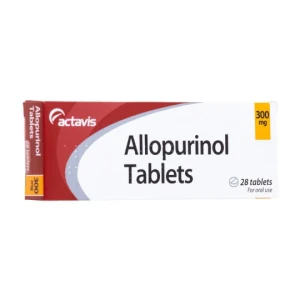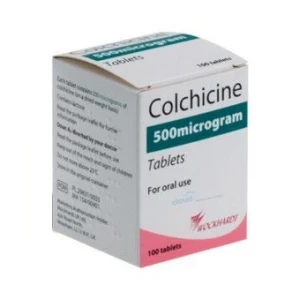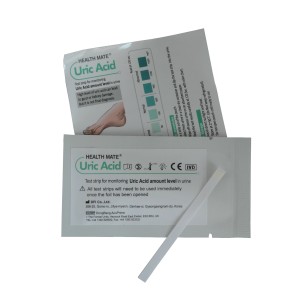Gout
Gout, a form of inflammatory arthritis, has a long history, dating back to ancient civilizations. Today, it affects a significant portion of the population in the UK.
We offer a range of Gout treatments. Our online prescribers are on hand to discuss our available products and help you find the right one for you.
Allopurinol
- Decreases uric acid
- Treatment for gout
- Next day delivery
Colchicine
- Treatment For Acute Gout
- Next Day Delivery
- Prescriber Available
Uric Acid Test
- Results In 120 seconds
- Colour Chart Included
- 5 Sealed Tests
What Is Gout?
Gout is a medical condition characterized by the accumulation of uric acid crystals in joints, leading to severe pain and inflammation. Historically known as the "disease of kings" due to its association with rich diets, gout affects people across all social strata. In the UK, gout's prevalence is estimated to be around 2.49% among adults, making it a significant concern.
How Does Gout Affect Joints and Overall Health?
Gout primarily impacts joints, often targeting the big toe. Uric acid crystals accumulate in the joint, causing intense pain, redness, and swelling. The discomfort can extend to other joints, such as knees and wrists. Over time, untreated gout can lead to joint damage and, in some cases, kidney stones. Additionally, it can have a profound impact on overall health, as gout has been linked to an increased risk of heart disease and diabetes.
What Causes Gout?
Uric acid, a natural waste product, plays a central role in gout. Excess uric acid in the blood can crystallise and deposit in joints, triggering painful attacks. Lifestyle factors, such as a high-purine diet (rich in red meat, seafood, and alcohol) and obesity, can contribute to elevated uric acid levels. Genetic predispositions and underlying health conditions, like hypertension and kidney disease, can also increase the risk of gout.
What Are the Symptoms of Gout?
Common symptoms of gout include excruciating pain, redness, and swelling in affected joints. However, the presentation of symptoms can vary from person to person. Some individuals experience milder, infrequent attacks, while others suffer from recurrent and severe episodes. The duration of a gout attack can range from a few days to several weeks.
How Is Gout Diagnosed?
Diagnosing gout involves a combination of medical history, physical examination, and sometimes, laboratory tests. Your healthcare provider, often a General Practitioner (GP), will inquire about your symptoms and risk factors. They may conduct a physical examination of the affected joint. In some cases, they may order blood tests to measure uric acid levels. Early diagnosis is crucial to initiate appropriate treatment and prevent long-term joint damage.
How Is Gout Treated?
Treatment options for gout aim to alleviate symptoms and reduce the risk of future attacks. Two commonly prescribed medications are Colchicine and Allopurinol. Colchicine helps relieve pain and inflammation during an acute gout attack. Allopurinol is used for long-term management by reducing uric acid production. These treatments should be tailored to your specific needs and are often based on NHS/NICE guidelines.
In addition to medication, lifestyle changes are vital in managing gout. Weight management, a balanced diet low in purine-rich foods, and alcohol moderation can help prevent gout attacks. Staying hydrated and avoiding crash diets are also recommended.
How to Prevent Gout Infection?
Preventing gout attacks is a crucial aspect of managing this condition. You can reduce the risk of gout by making dietary adjustments, such as reducing red meat and seafood consumption while increasing the intake of low-purine foods. Regular exercise helps maintain a healthy weight and may lower uric acid levels. In some cases, medication may be prescribed to prevent future gout attacks.
Gout is a painful and debilitating condition, but with proper management, its impact can be significantly reduced. Early diagnosis, lifestyle modifications, and appropriate medical treatment can help individuals lead a healthier and more comfortable life. If you suspect you have gout or have been diagnosed, it is crucial to consult with a healthcare provider for personalized advice and a tailored treatment plan.
It is imperative to consult with a healthcare provider for personalized guidance on managing gout. Your GP can provide you with a treatment plan that suits your specific needs.
For convenient access to gout medications and expert consultation, visit Prescription Doctor. We are here to support you with personalized advice, prescription services, and discreet medication delivery.
Authored By

Melissa Keen
Medical Content WriterPublished on: 07/11/2023
Reviewed By

Dr Giuseppe Aragona
DoctorReviewed on: 07/11/2023
Fill simple medical questionnaire
Prescriber reviews consultation
Pharmacy reviews the order
Medication sent In discreet packaging
© 2013 - 2024 Al Muhsineen Limited. All Rights Reserved. Registered Pharmacy: 34 Halliwell Road, Bolton BL1 8RL. Registered Office: 254 First Floor, Shearbrow, Blackburn, England, BB1 8DS






